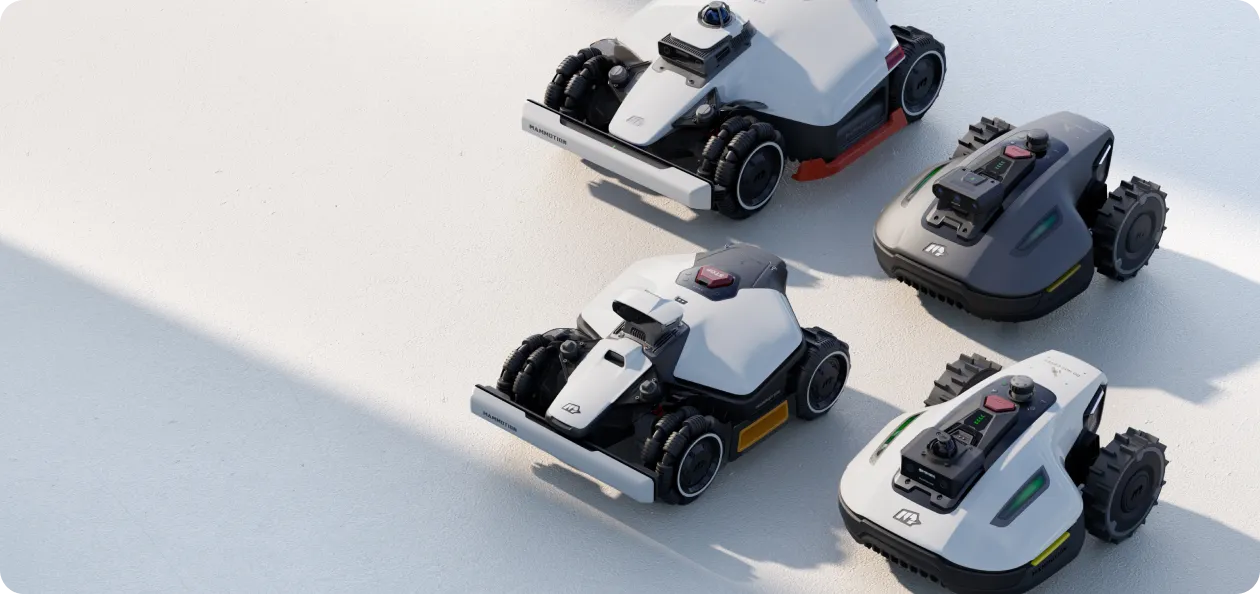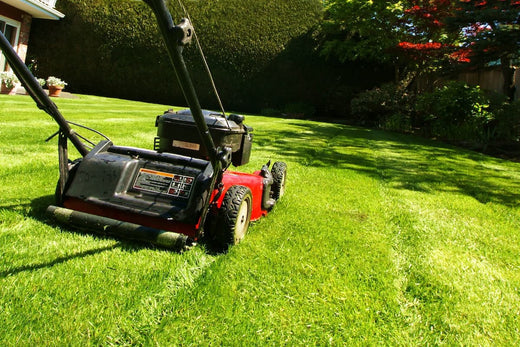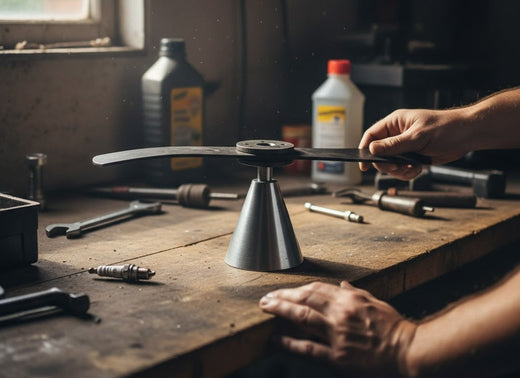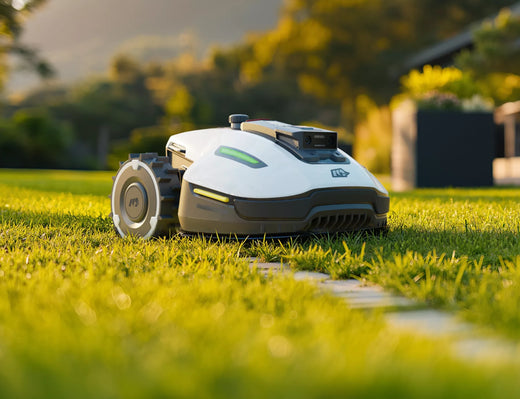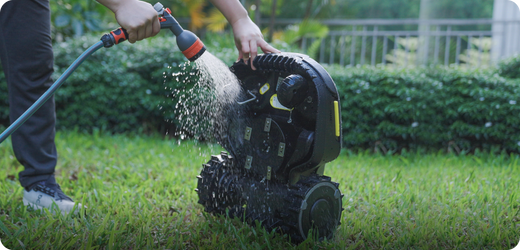Maintaining a beautiful lawn requires the right tools, and for many homeowners, a reliable lawn mower is at the heart of this effort. However, as technology evolves and needs change, you may find yourself with an old mower that no longer meets your requirements. Whether it's a non-working machine that's taking up space or an operational model that simply doesn't cut it anymore, knowing how to dispose of old lawn mower responsibly is crucial. In this guide, we’ll explore effective disposal methods for both non-working and working old lawn mowers, ensuring that you can declutter your garage while making environmentally conscious decisions.
5 Ways to Disposal of Non-Working Lawn Mower
Getting rid of a non-working lawn mower might seem challenging, but there are many eco-friendly and practical options available in the U.S. Here's how you can responsibly dispose of your old equipment:
1. Recycling
Recycling is one of the most environmentally friendly ways to dispose of a non-working lawn mower. Many lawn mowers contain recyclable materials like metal, aluminum, and certain plastics. By taking your old mower to a recycling center, these components can be repurposed, reducing landfill waste.
What to Do: Locate a local metal recycling center or scrap yard near you. Many of these facilities accept lawn mowers, but be sure to drain and remove hazardous materials like fuel or oil beforehand.
Helpful Tip: Use resources like Earth911 to find recycling centers in your area.
This is an ideal solution for those who are environmentally conscious and want to ensure their old equipment is reused properly.
2. Municipal Recycling Centers or Waste Collection Services
Many cities and towns in the U.S. offer municipal recycling centers or designated days for collecting large household items, including non-working lawn mowers.
What to Do: Contact your local waste management department or check their website for details about large-item pick-up schedules or drop-off locations.
Fees and Regulations: Some services might charge a small fee for disposal, so it’s a good idea to ask about costs upfront.
This is a convenient option for those who prefer a straightforward solution and don't want to transport the mower far.
3. Electronic Waste Recycling Services

For electric lawn mowers, specialized electronic waste (e-waste) recycling services are often the best choice.
What to Do: Find a certified e-waste recycling service near you that handles electronic components, batteries, and wiring. Many areas also host free or low-cost e-waste recycling events.
Why It Matters: Properly disposing of lithium batteries and other electronic components prevents harmful materials from leaching into the environment.
Some retail chains, like Best Buy and Staples, also accept certain e-waste for recycling. Call ahead to confirm they accept electric lawn mowers.
4. Professional Equipment Disposal Services
Professional disposal services specialize in collecting and handling large or complex items like lawn mowers.
What to Do: Search online for equipment disposal companies in your area. Many of them offer home pick-up services, which is convenient if your lawn mower is too heavy to transport.
Cost: These services typically come with a fee, which varies based on your location and the size of the mower.
This option is perfect for users who want a hassle-free solution and peace of mind knowing their mower is being handled properly.
5. Rent a Dumpster
Renting a small dumpster can be an effective solution if you have multiple items to dispose of, including an old lawn mower.
What to Do: Contact a local waste disposal company to rent a dumpster for a day or a weekend. Place your lawn mower, along with other unwanted items, in the dumpster, and the company will handle the rest.
Best For: This is ideal for those undergoing a large home cleanout or landscaping project and need to dispose of a higher volume of waste.
Final Tips for Disposal
Check Local Regulations: Disposal rules and fees vary by state and city. Always check your local guidelines to ensure compliance.
Remove Hazardous Materials: Before disposal, drain any fuel, oil, or other hazardous materials from the mower. Many recycling centers and disposal services require this step.
By following these methods, you can responsibly dispose of your non-working lawn mower while minimizing environmental impact and complying with local regulations.
7 Ways to Disposal of Working Lawn Mower
If you have a working lawn mower that you no longer need, there are plenty of eco-friendly, practical, and community-oriented ways to pass it on or repurpose it. Whether you’re upgrading your equipment, downsizing, or simply looking for a change, these options will help you dispose of your lawn mower responsibly.
1. Sell It Online or Through Local Marketplaces
Selling your working lawn mower online can help you recoup some of its value while connecting with local buyers. Many people are looking for affordable, pre-owned lawn care equipment, making this a popular option.
Best Platforms:
Use platforms like Craigslist, Facebook Marketplace, OfferUp, and Letgo. These sites are widely used in the U.S. for buying and selling second-hand items.
Steps to Sell Successfully:
- Take clear and detailed photos of your lawn mower from different angles.
- Provide information on its model, age, and condition. Mention any recent maintenance or upgrades (e.g., “new blade installed” or “recently serviced”).
- Set a competitive price based on its market value. Research similar listings to ensure your price is reasonable.
- Highlight benefits like “easy to start,” “low maintenance,” or “ideal for small yards” to attract more interest.
2. Donate to Charities or Community Organizations
Donating your lawn mower is an excellent way to give back to the community while ensuring the equipment remains useful.
Who Accepts Donations:
Habitat for Humanity ReStores: These nonprofit stores often accept garden tools and lawn care equipment for resale.
Goodwill: Some branches accept functional lawn mowers.
Local Schools or Community Centers: These organizations may need equipment for maintaining sports fields or community gardens.
What to Do Before Donating:
- Contact the organization to confirm they accept lawn mowers.
- Clean the equipment thoroughly.
- Drain any fuel or oil to ensure safe transportation and storage.
3. Trade-In Programs at Retailers
Upgrading to a newer lawn mower? Many home improvement stores offer trade-in programs where you can exchange your old mower for a discount on a new one.
Participating Retailers:
Home Depot, Lowe’s, and other local garden equipment suppliers occasionally run trade-in promotions.
How It Works:
- Bring your old mower to the store during a promotion.
- Receive a discount or store credit for purchasing a new model.
4. Host a Garage Sale

A garage sale is a great way to sell your working lawn mower while clearing out other unwanted items.
How to Get Started:
- Advertise your sale on platforms like Craigslist, local Facebook groups, and community bulletin boards.
- Schedule the sale during peak seasons, such as spring or early summer, when lawn care demand is high.
- Set up your lawn mower in a prominent spot to attract buyers.
Additional Tips:
Offer to demonstrate the mower’s functionality for potential buyers. Clean it beforehand to make it more appealing.
5. Give It to a Friend
Helping someone you know is one of the easiest and most rewarding ways to pass on a working lawn mower.
Who to Consider:
New homeowners, neighbors who recently moved in, or friends who are starting lawn care for the first time.
Why It’s a Good Option:
It requires no marketing effort and ensures the lawn mower is appreciated and used.
6. Give It Away Through Online Freecycle Groups
If you prefer to give your lawn mower away for free, consider joining local Freecycle or Buy Nothing groups.
How It Works:
- Post a listing with photos and a description of the lawn mower’s condition.
- Interested individuals will contact you to arrange pickup.
7. Repurpose or Use for Spare Parts
If you’re the DIY type, repurposing your lawn mower can be a creative way to extend its usefulness.
Ideas for Repurposing:
- Convert the engine into a go-kart motor or use it for other small machinery projects.
- Salvage parts like wheels, blades, or handles for repairs or crafts.
- Turn the mower deck into a garden cart or planter.
Final Tips for Disposal
Prepare the Lawn Mower: Clean it, drain all fuel and oil, and ensure it’s safe for transport or storage.
Research Local Rules: Disposal regulations vary by state and city. Check local guidelines to avoid any legal issues.
Choose the Right Season: Spring and early summer are the best times to sell or donate a lawn mower, as demand for lawn care equipment is highest.
By exploring these options, you can responsibly dispose of your working lawn mower while supporting your community, protecting the environment, or earning some extra cash.
Why Dispose of Your Old Lawn Mower?
A. Environmental Concerns
Old lawn mowers, especially those that run on gas, can have a significant negative impact on the environment. Traditional gas-powered mowers emit harmful pollutants like carbon monoxide, hydrocarbons, and nitrogen oxides, which contribute to air pollution and can lead to health problems for both humans and wildlife. Additionally, if an old mower leaks oil or gasoline, it can contaminate the soil and groundwater, causing further ecological harm.
B. Safety Risks
Keeping an old or non-working lawn mower can also pose safety risks. Mowers that have reached the end of their operational life may have worn-out blades, malfunctioning parts, or exposed wiring, making them dangerous to use. Accidents can result in severe injuries, not just to the operator but also to bystanders, especially children and pets.
C. Practicality and Performance
As lawn care technology advances, older models become less efficient compared to their modern counterparts. Newer mowers, especially robotic models like those offered by Mammotion, provide superior performance, ease of use, and advanced features such as automated mowing schedules, intelligent navigation, and lawn printing technology. Transitioning to a new mower can save you time and effort while achieving better results in maintaining your lawn.
Preparing Your Old Lawn Mower for Disposal
Step 1:Check Local Regulations
Before disposing of your lawn mower, it’s important to familiarize yourself with local regulations regarding disposal methods. Different municipalities have varying rules for the disposal of lawn mowers, especially when dealing with hazardous materials like gasoline and oil. Some areas may require special disposal sites, while others may have designated days for hazardous waste collection. By understanding these guidelines, you can ensure that you dispose of your mower responsibly and avoid fines.
Step 2:Drain Fluids and Clean
One of the most important steps before disposal is draining all fluids. Be sure to carefully remove any gasoline or oil to prevent leaks that could harm the environment. Many communities have designated disposal sites for these fluids, so be sure to locate one nearby. After draining the fluids, clean the mower to remove grass clippings, dirt, and other debris. A clean mower is not only more presentable for potential buyers or donors but also helps prevent the spread of pests and diseases.
Step 3:Check for Functionality
If you plan to sell, donate, or give away your mower, it’s important to check its functionality first. Test the engine, blades, and any additional features to ensure they’re in working order. A mower that starts easily and cuts well is more likely to attract interest. If there are minor issues, such as dull blades or a sticky throttle, consider making simple repairs. Small fixes can significantly increase the mower’s value and make it more attractive to potential new owners.
Step 4:Remove Personal Items
Inspect the mower for any personal items or accessories that may have been stored with it. Items like tools, bags, or manuals should be removed before disposal. If you plan to sell or donate the mower, providing these items can enhance its value and utility. Giving the next owner everything they need to operate and maintain the mower effectively adds to its appeal.
Step 5:Gather Documentation
Lastly, collect any documentation related to the mower, such as manuals, receipts, or warranties. Having these documents available can boost your chances of a successful sale or donation, as potential buyers or recipients will feel more confident in their acquisition. For those looking to trade in their mower, having proof of purchase or maintenance history can lead to better offers.
Frequently Asked Questions
1. Are old lawn mowers worth anything?
Yes—old lawn mowers are often worth something, because working or repairable units can be sold locally and even non-runners have scrap-metal value once fluids are removed.
If it starts and cuts, list it on local marketplaces; if it doesn’t, many municipal programs and scrap metal yards accept drained mowers as recyclable metal (and the rechargeable battery from electric mowers can be recycled at retail drop-offs), so you can still recover value or at least avoid disposal costs.
2. What to do with an old lawn mower?
Sort your old mower into one of three paths—sell/donate if it works, recycle it as scrap metal after draining fluids, or book municipal bulky pickup.
Selling or donating keeps a usable tool in service; if donating, note that many big charities don’t accept gas mowers, while recycling typically requires you to drain gasoline and oil (household hazardous waste rules) and remove rechargeable batteries for separate drop-off; if neither is feasible, check your city’s bulky-item program for curbside collection.
3. Can you sell old lawn mowers?
Yes—you can sell old lawn mowers locally, especially if they start and cut; be transparent about condition and maintenance.
Buyers look for running units or easy fixes; list on neighborhood platforms and include photos/videos, note any issues, and avoid shipping (fuel and battery rules); Consumer Reports and other guides broadly recommend selling still-usable items rather than trashing them.
4. What to do with a lawn mower that has been sitting for years?
To deal with a mower that’s been sitting for years, revive it step-by-step:
- Drain stale fuel completely; add fresh gas (or charge/replace the battery on electric units).
- Check/change the spark plug, air filter, and engine oil.
- Inspect/clean the carburetor if it still won’t start (old fuel gums jets).
- Verify blade condition and that the deck spins freely before running at full power.
These steps target the most common storage-related failures—bad fuel, fouled spark, clogged carburetors, and neglected filters/oil—per small-engine makers’ troubleshooting.
5. What to do with an old lawn mower that doesn't work?
If it doesn’t work and you don’t want to repair it, recycle it as scrap metal after draining all fluids and removing any battery (and you can also list it “for parts” if someone wants to fix/flip it).
Counties and cities commonly accept drained mowers at scrap-metal drop-offs/transfer stations; oil and gasoline must go to proper collection points, and rechargeable batteries should go to battery-recycling drop-offs—don’t toss any of these in the trash.
6. How to dispose of an old lawn mower for free?
Free disposal options usually include your city’s bulky-item pickup, a free scrap-metal drop-off day/center, or giving it away curbside after you remove fluids.
Many municipalities offer no-fee bulk collection on a schedule, transfer stations take drained mowers as scrap, and in some areas simply placing a clearly labeled, drained mower on the curb is allowed or quickly picked up by metal recyclers; always remove and properly handle fuel, oil, and rechargeable batteries first.
7. How do I get rid of an old lawn mower near me?
To get rid of an old mower “near me,” use a locator and your local services in this order:
- Search Earth911 for “lawn mower” or “scrap metal” to find drop-offs.
- Check your city/county website or your hauler for bulky-item pickup rules and dates.
- If electric, use Call2Recycle to find a nearby rechargeable-battery drop-off for the pack.
This combo quickly surfaces the nearest legitimate recycling or pickup options specific to your address.
8. How to recycle an old lawn mower?
To recycle an old mower, follow these quick steps:
- Run or siphon out all gasoline and drain engine oil into sealed containers for HHW/oil recycling.
- Remove the battery (rechargeable or lead-acid) for separate battery recycling.
- Strip off obvious non-metal parts if required locally, then deliver the metal chassis to a scrap-metal recycler/transfer station.
These steps align with environmental rules (never bin oil or lithium batteries) and with recyclers’ common intake requirements.
9. Who picks up old lawn mowers for free?
Free pickup is most commonly offered by your city’s bulky-waste service; opportunistic scrap-metal collectors may also take a drained mower set out with a “free” sign, while charities rarely take gas mowers.
Example: NYC provides scheduled bulk collection at no extra charge, and many other cities have similar programs; ad-hoc “free pickup” by charities is uncommon for fuel-powered equipment due to safety/liability, so confirm first if you try to donate.
10. Will scrap yards take old lawn mowers?
Yes—scrap yards and many transfer stations will take old lawn mowers, typically only after you drain all fuel and oil (and remove any battery).
County and city guidance explicitly lists lawn mowers as acceptable scrap metal when fluids are removed, and many facilities publish that requirement up front.










